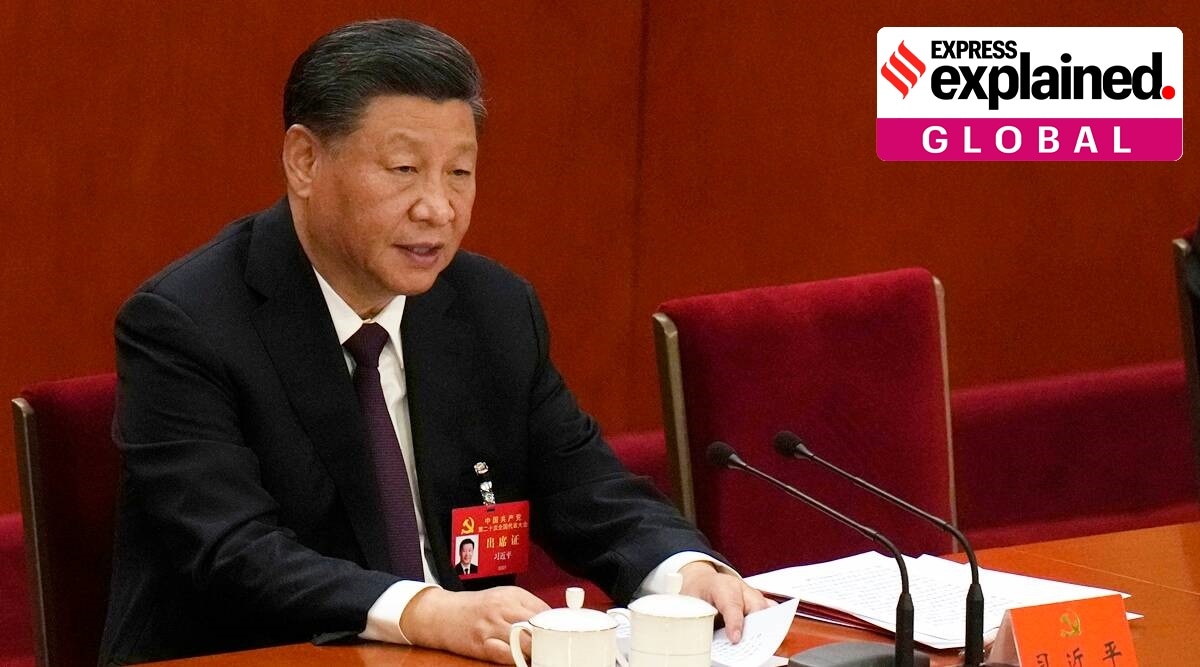Why China’s tech stocks tanked after CCP’s 20th National Congress
Foreign investor sentiment, spooked by Xi’s grip on power, continued to remain cautious, after Xi did not announce any easing of the pandemic restrictions.
 Chinese President Xi Jinping speaks during the closing ceremony of the 20th National Congress of China's ruling Communist Party at the Great Hall of the People in Beijing, Oct. 22, 2022. (AP)
Chinese President Xi Jinping speaks during the closing ceremony of the 20th National Congress of China's ruling Communist Party at the Great Hall of the People in Beijing, Oct. 22, 2022. (AP)After tanking on Monday (October 24) following President Xi Jinping’s strengthened grip on power by securing a record-third term as the country’s supreme leader, US-listed Chinese stocks bounced back on Tuesday (October 25).
Anxious foreign investors had dumped large amounts of stocks after the Chinese Communist Party’s (CCP’s) National Congress, held every five years, concluded on Sunday (October 23). The Nasdaq Golden Dragon index, which tracks US-listed shares in Chinese companies had fallen 14.4 percent on Monday, the Financial Times reported, and tech stocks were also hit hard.
Which companies were hit?
Shares of the Chinese tech giants, Alibaba and Tencent had dropped by more than 11 percent in New York on Monday, removing a total $54 billion off their stock market value, CNN reported. While Jack Ma, Alibaba’s co-founder lost $900 million on Monday, according to Forbes, reducing his net-worth to $20.5 billion.
Shopping platform Meituan dropped by more than 14 percent, while BBC reported that internet company Baidu lost 12.6 per cent and e-commerce platform Pinduoduo fell by almost 25 percent.
However, onshore investors were not affected as much, with the SSE Index of stocks traded at the Shanghai Stock Exchange dropping by only 2 percent on Monday, Forbes reported.
Strengthened grip on power
During the week-long 20th Congress, President Xi solidified his authority with a third term, as was widely expected. On Sunday, he also packed the Politburo Standing Committee (PBSC), which sits at the peak of the Chinese Communist Party’s (CCP’s) structure of power, with his key loyalists. Seven members, including Xi at the top, make up the body.
In the leadership reshuffle, four people were booted from the old PBSC — Li Keqiang, Wang Yang, Li Zhanshu and Han Zheng. Li Keqiang and Wang Yang were powerful figures and seen as some kind of opposition to Xi.
The PBSC, which according to the Financial Times acted as a check on the supreme leader’s power through a convention which allowed it to be constituted of politicians from different factions of the party, has now been filled with Xi’s loyalists. While two of his trusted allies, Zhao Leji and Wang Huning were able to retain their positions in the PBSC, four new members with long-standing ties to Xi were included in the body — Li Qiang, Cai Qi, Ding Xuexiang and Li Xi.
Why were investors fearful?
While Xi’s continued hold on power was expected, during the week-long event many of China’s important officials who helped the country establish itself as a dominant force in the world economy today were ousted, Forbes reported. This included the economist Li Keqiang and Xi’s predecessor Hu Jintao, who was publicly led out of the meeting on Saturday (October 22).
The Chinese economy has been stagnating due to long-standing structural factors, pressure from a trade with the US and China’s stringent zero-covid policies, which put some of the country’s biggest cities under lockdown.
Foreign investor sentiment, spooked by Xi’s grip on power, continued to remain cautious, after Xi did not announce any easing of the pandemic restrictions which have restricted economic growth.
China’s economy is facing “policy stimulus and multiple growth headwinds including Covid restrictions, a property market downturn and slowing exports,” Minyue Liu from BNP Paribas Asset Management told the BBC.
- 01
- 02
- 03
- 04
- 05





































